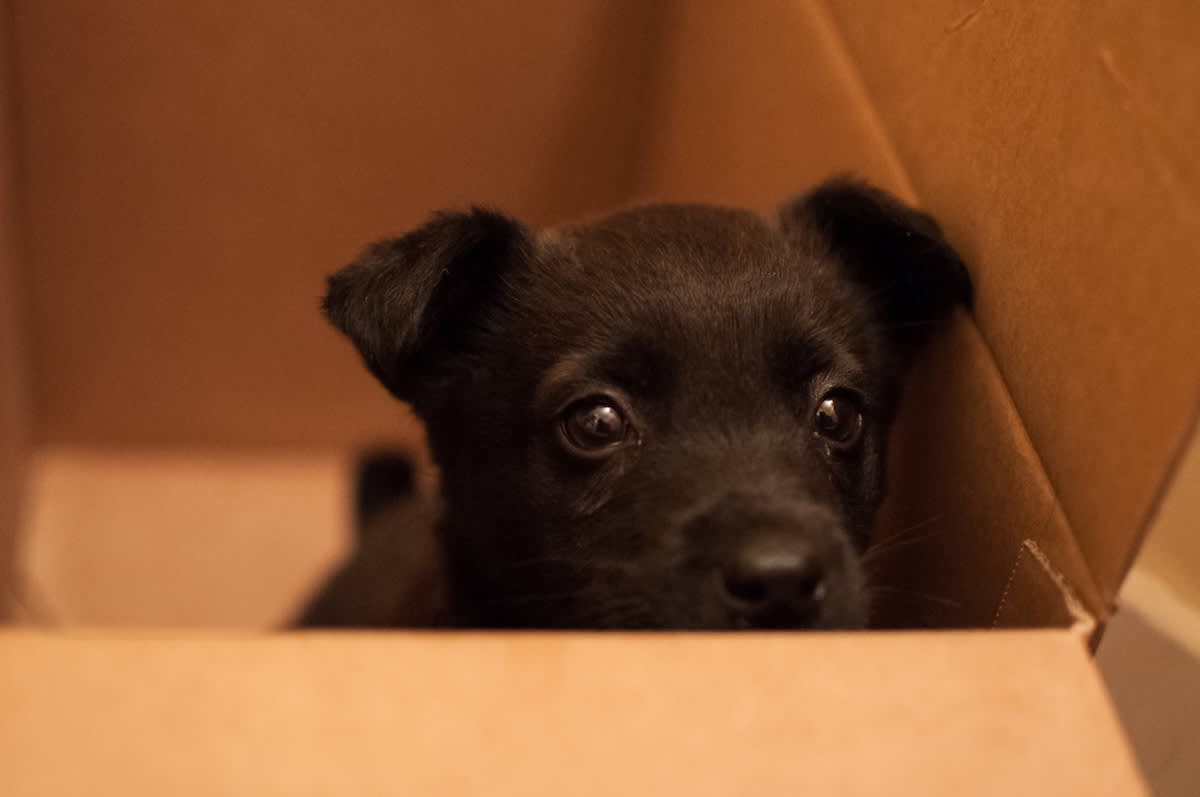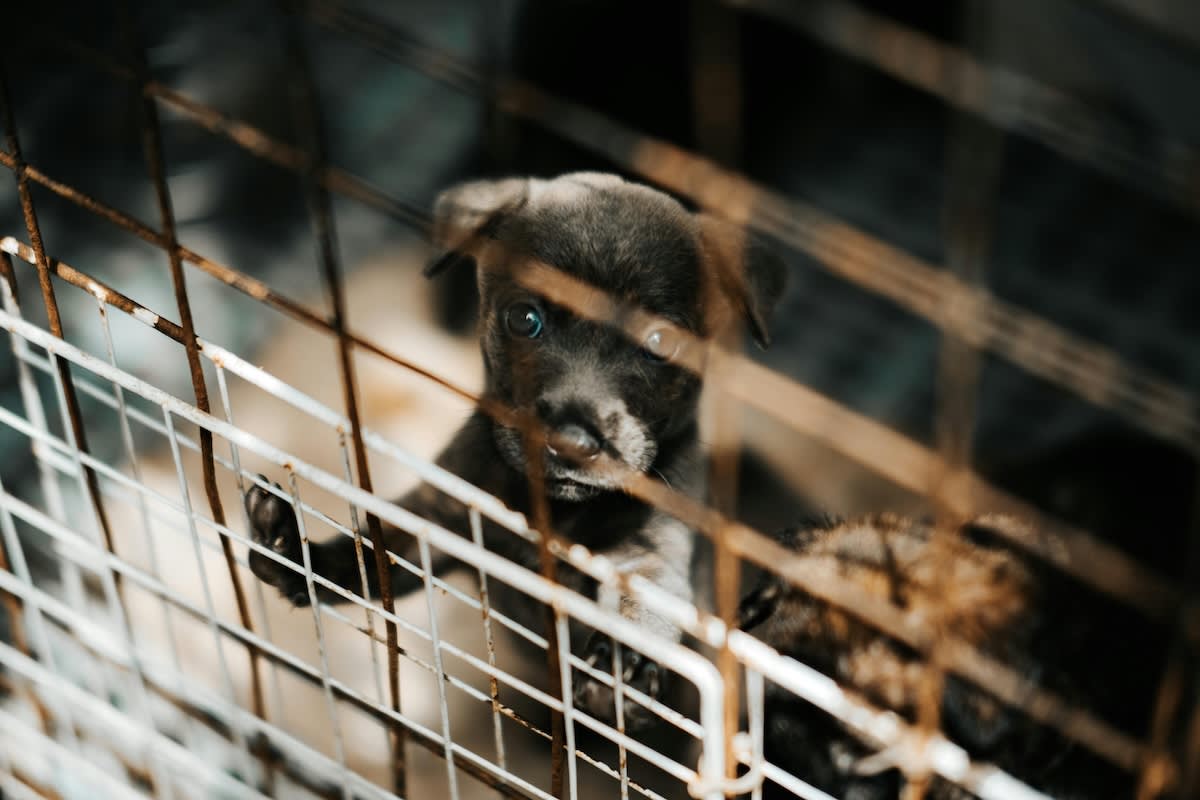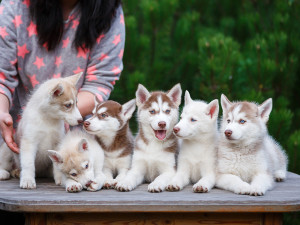How to Spot a Fake Puppy Scam
Intent on buying a puppy from a breeder? Read this first

Share Article
When Kate Margolis, from the Cotswolds, decided she was ready to welcome a puppy into her home, she started her search by googling ‘Golden Retriever breeder’ and found what she thought to be a legitimate website with glowing testimonials, professional photos and a list of credentials.
“I transferred a £500 deposit for a Golden Retriever I’d fallen in love with, only to be told it had eaten plastic and died,” Kate, co-founder of the pet-fraud prevention app Petproovopens in new tab, says. “I never saw the puppy, or my money, again.” Kate had been the victim of a puppy scam.
The ‘seller’ disappeared – their website shut down and phone disconnected.
Following her first hand heartbreak, Kate learned that puppy scams are all too common in the UK, and went on to create PetProov to help prospective pet owners and breeders make informed decisions about buying a pet.
“My experience wasn’t rare,” she said. “These scams are happening every day.”
Action Fraud – the national reporting centre for fraud and cyber crime – foundopens in new tab that Brits have lost £7.2m to pet scams since 2019, with 14,300 reports made during that time. One of the main puppy scams that would-be buyers encountered involved the advertising of a pup that doesn’t actually exist. The deposit gets paid, and you don’t get your puppy that was promised.
If you are intent on purchasing a puppy from a breeder (responsible reminder alert: there are thousands of free pups looking for a loving home in rescue centres right now!), here’s what you need to know to avoid getting scammed by fraudsters who advertise for puppies and then abscond with your money without delivering the puppy you paid for.
Puppy scams on the rise in the UK
Kate says that during and after lockdown, puppy prices soared, with sellers looking to make fast cash.
“Scammers know people are desperate to find ‘the one,’ and they prey on that emotional urgency,” Kate says. “Add to that the rise of AI-generated images and it’s harder than ever for buyers to tell what’s real.”
Online puppy scams have continued increasing, according to Kate, because “the demand for pets still outstrips the number of responsible, ethical breeders.”
“Social media and online marketplaces have made it incredibly easy for scammers to set up convincing profiles, often stealing real breeders’ photos or creating professional-looking websites overnight,” she continues.
Red flags to watch out for with puppy breeders
In creating her app, Kate has repeatedly found there are several red flags that should alert you that the ad you’re viewing is fake, and should cause any buyer to pause. If you encounter even one of the following red flags, you should stop immediately and do more checks.
Unusually low price
If you’re looking for a puppy, you’ll quickly learn what the going rate is for the breed you’re after. If you stumble upon an advertisement with a lower-than-normal price, start asking questions.
“If the price is too good to be true – if a puppy is listed hundreds below the average for that breed – something is off,” says Kate.
Refusal to show you the puppy on live video
Even though there may be adorable, and even professional photos of your puppy online, you need to ask a seller to see the puppy live on video.
“Genuine breeders will happily video call and show you the litter with the mother,” Kate says.
But be aware, even live videos can be pre-recorded or use AI to fake video calls. You should never skip an in-person visit before making a payment.
Pressure tactics
Is the seller trying to rush you to make a decision? Perhaps they might be telling you there are other buyers waiting, that this puppy is the last one left, or that it’s first come first serve, and you need to send a deposit as soon as possible to secure your puppy.
These pressure tactics should send alarm bells. Buying a puppy is a big decision and genuine breeders will want to respect the time you need to take in order to make it.
Unusual payment methods
If a seller asks you to pay for the puppy via cash, cryptocurrency, gift cards, or any other form of insecure method of payment, be aware that this means it could be a scam. These payments are difficult to trace, making it nearly impossible to get your money back if something goes wrong.
You’ll want to use bank transfer, credits or debit cards, or even an established escrow service for payment.
But before you pay, make sure you have seen the puppy in real time, ideally in person.
Familiar photos
If the puppy in the photo looks perfect in every way, perhaps you even recognise the photo, that’s a red flag as scammers have been known to steal images and post them as their own.
Kate suggests reverse image searching the photo (remember Catfish?!). You just upload the image or provide a link to it, and then you will be directed to related images, original sources and websites where it has appeared previously, if it has.
Another consideration is, of course, AI. Scammers are increasingly making use of the advances in AI for nefarious purposes – creating images and even videos of pets that don‘t exist at all. As it is becoming harder and harder to spot works of AI, meeting a puppy in person is all the more important.
Missing paperwork
Reputable breeders should have no problem showing your all the paperwork – vet records, vaccination records, health certificates and microchipping details.
They should be transparent about health tests and lineage, and will provide you with a contract of sale to sign.
If not, walk away.
Multiple breeds advertised
“Genuine breeders usually specialise in one or two breeds,” says Kate. “Not a dozen.”
If multiple breeds are advertised by one breeder, that’s cause for concern.
How puppy scams work
Scammers aren’t stupid and have become highly inventive to trick puppy buyers.
“Their scams rely on urgency, emotion and convenience – that feeling that you’ve found your dream puppy and need to act fast before someone else does,” says Kate.
PetProov regularly come across five types of scam:
Fake websites that mimic real breeders, with professional-sounding pedigree names and logos.
Social media marketplace scams where advertisements appear local, but the seller disappears once payment clears.
‘Emergency’ rehoming stories. For example, “We’re moving abroad next week, we just want a good home.”
Puppy reselling schemes, where scammers buy dogs cheaply and pass them off as home bred.
Fake testimonials and stolen reviews. Always check reviews independently, not just on the seller’s site.
Real examples of UK fake pet adverts
A typical scam ad might feature a litter of “rare” or “designer” puppies for a bargain price, often lifted directly from a legitimate breeder’s website or generated using AI, Kate explains.
“The scammer will message you with photos, sometimes videos, and say the puppies are ready to go but can only be delivered,” she continues. “Once you pay a deposit, they’ll vanish, or invent extra shipping or insurance fees before disappearing completely.”
Kate’s team even recently went under-cover, contacting someone advertising Golden Retrievers on Facebook.
“They used an image found across multiple places online, and asked for a shipping fee,” she says.
In the back-and-forth messaging, the ‘seller’ said the puppies weren’t actually being sold, but were up for adoption. The buyer was told that they just need to pay the shipping fee (£100), and the puppy (whose photo was sent) would be delivered.
This was a clear puppy scam, says Kate.
Other examples include a victimopens in new tab who tried to buy a Shih Tzu from a free ad’s website. The person called the breeder and planned to collect the puppy from Inverness. But after the £200 deposit was paid, all contact ended and the collection never happened.
Questions to ask a breeder before buying a puppy online in the UK
There are six questions Kats says you should ask before buying a puppy online.
“If a breeder avoids or dodges any of these questions, that’s a huge red flag,” Kate says.
Can I see the puppy with its mother on a video call or in person? (Make sure you eventually see the puppy in person but asking for a video call is a good first test).
What health tests have been done, and can you show the certificates?
Is the puppy microchipped and vaccinated?
Can I visit the premises where the litter was raised?
Do you have references from your vet or previous buyers?
What support do you offer after sale?
How to verify a dog breeder is legitimate
The Kennel Club puppy finder website is a solid starting point as it lists breeders who are KC registered (so there’s at least some oversight), but it’s not a guarantee of quality or welfare standards now the Assured Breeder Scheme has been closed.
“Ask for the breeder’s license number (required if they breed more than three litters a year) and verify it with their local council,” says Kate.
If you’ve seen a photo of puppy that has stolen your heart, reverse search the image to confirm the picture is original.
“Always request new photos or videos with today’s date or a specific gesture (for example, the breeder holding a spoon next to the puppy),” Kate suggests.
A genuine breeder will always welcome questions – they want the best homes for their pups, and questions from a potential buyer show a breeder that the buyer will take care of their dog.
They’ll also ask you questions about yourself. “Above all, they’ll care where their puppies end up,” says Kate. “Scammers just care about the money.”
Margolis’s app, PetProov, help buyers verify breeder identities through photo ID and licensing checks for £4.99 per pet. “We will give you a risk-score based on the breeder’s ID verification, giving you extra reassurance before you pay a penny,” she says.
How and when to pay for a puppy
Once you have confirmed a breeder is legitimate, the safest approach is to avoid paying in full until you’ve seen the puppy in person and verified all the paperwork.
“A genuine breeder may ask for a small deposit to secure your puppy,” says Kate. “That’s normal, but it should only happen after you’ve met them, seen the litter with the mother, and received written confirmation of what the deposit covers.”
Whenever possible, use a secure, traceable payment such as a bank transfer or debit or credit card, as these create a clear record of the transaction and in some cases, offer buy protection if something goes wrong.
Kate suggests using an established escrow service for even greater protection. “This holds your payment securely until you’ve collected the puppy and confirmed everything is as promised – helping protect both the buyer and the breeder,” she says.
Always make sure you have written confirmation of the puppy’s details, total price and deposit amount, both parties’ full contact details and refund terms and health check agreements.
“The final balance should only be paid on collection day, once you’ve seen the puppy again, reviewed the vaccination and microchip paperwork and confirmed all details match,” Kate says.
Safe places to get a puppy in the UK
It might feel like you are venturing into the wild west as you start your puppy search, but rest assured, there are plenty of safe, honest breeders – it’s just a matter of finding them,
If you’re determined to buy a puppy from a breeder, see if the breeder is on the Kennel Club’s Assured Breeders list (although bear in mind that haven't taken any new registrations since 2024), and then cross check the breeder with their local council, making sure none of the red flags are present.
You can also check out legitimate rehoming centres who are overrun with petsopens in new tab desperate for a loving home at the moment. Kate suggests Dogs Trust or Battersea and notes there are also breed-specific rescues if you’ve got a particular breed you want in mind.
“Whatever you do, never rush a purchase or pay in full before meeting the dog,” Kate says. “Always use secure payment methods with buyer protection, and get everything in writing.”
What to do if you've been scammed
If you suspect you have been scammed, it’s vital to immediately stop all communication with the seller and report it to Action Fraud, your bank (to try and recover your money), and the website or platform hosting the ad (so they can remove it).
“Keep all screenshots, messages and payment receipts, they’re vital for investigations,” says Kate “And please share your experience with others; every warning helps prevent another family from being caught out.”
Why you shouldn’t buy a puppy if you feel sorry for it
You’ll have heard people admit they bought a puppy to rescue it from bad conditions.
“That’s exactly what scammers and irresponsible sellers rely on,” says Kate. “They know that once you’ve seen a frightened or neglected puppy, emotion often overrides logic. However, handing over money only fuels the cycle. It rewards bad breeders, giving them funds to exploit more animals and deceive more buyers.”
The kindest thing you can do is walk away and report what you’ve seen, and find a verified breeder or reputable rescue centre instead.
“Every time someone refuses to buy from a bad source, it weakens their business and helps protect future puppies,” Kate says.
Frequently asked questions
What are the signs of a fake puppy ad?
An unusually low price, refusal to show you the puppy live, pressure tactics, unusual payment methods, familiar photos, missing paperwork or too many breeds advertised could all be signs of a fake puppy ad.
How can I tell if a dog breeder is legitimate?
The breeder should be part of the Kennel Club’s Assured Breeder Scheme (which can be verified through their local council), have offered you original, up-to-date photos, answer your questions, ask you questions, and provide all the paperwork required.
What should I do if I’ve been scammed buying a puppy?
Immediately stop all communication with the seller and report it to Action Fraud, your bank, and the website or platform hosting the ad. Keep all screenshots, messages and payment receipts for investigations.
Puppy or kitten under one year old? Check out littleKin™, Kinship’s home just for puppy and kitten parents. Get advice, tools and support – and see if you’re eligible for a free littleKin Puppy or Kitten Pack full of treats from brands pet parents love.

Lauren Crosby Medlicott
Lauren is a freelance journalist who lives with her family and black Labrador, Betsie, in the South Wales Valleys. When she’s not working, she loves going for a dip in a nearby river and hiking in the Brecon Beacons.
Related articles
![two jack russell puppies sit on an orange bed]()
How to Find a Reputable Dog Breeder in the UK
Sadly, there are people out there without dogs’ best interests at heart
![Portrait of six pure-bred Husky puppies sitting side by side on a table while their breeder tried to arrange them for a photo in the background]()
12 Red Flags You Should Watch Out For in a Dog Breeder
Look out for untrustworthy breeders – and report them
![A dog lying on a rug with a litter of puppies feeding from her.]()
Why You Shouldn’t Adopt a Pet From Social Media or Buying/Selling Sites
It’s not quite the same as buying secondhand clothes…








